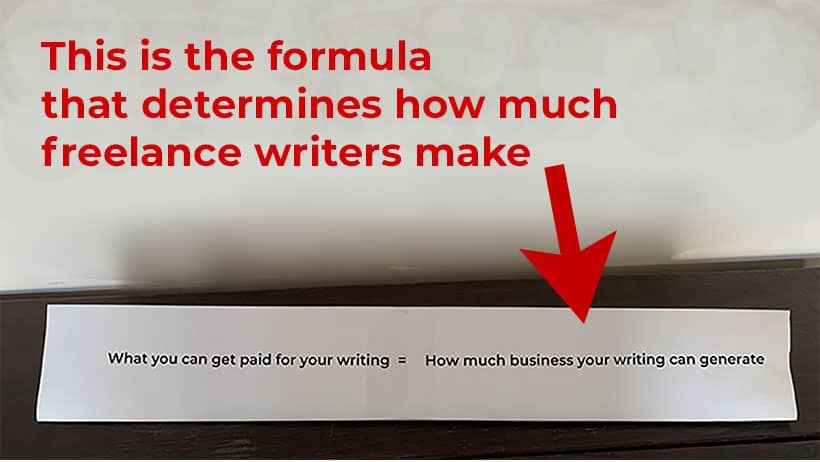The Formula for How Much Content Writers Make
Want to know the secret formula that determines how much freelance content writers make?
It’s this:
What you can earn from your writing = How much money your writing can generate
That’s it. That’s the “secret” to earning radically more money from your freelance writing.
It’s not hard. It’s not complicated. And it’s definitely not personal… though I can see how it might feel like a personal slight the first time you hear it.
You see, if you’re not being paid well for your writing, it’s probably not because you’re a bad writer. If you have chosen to write out of all the other things you could possibly be doing for money, you’re probably pretty good at it.
If people are paying you to write for them at all, even if they aren’t paying you well, you’re probably a good writer.
But — as you know — being a good writer does not mean you’ll automatically earn good money. Most freelance writing job boards make this abundantly clear. I’m sure you’ve seen job listings offering $30 for “a well-researched, 2,000-word blog post.”
This idea that the quality of our writing does not necessarily equal good pay can be a little challenging for some writers at first. And they’re right to object: To a certain extent, you do have to write well to get paid anything.
But simply being a good writer isn’t enough.
If you want to earn money from your writing — good money, the type of money you can actually live on — you’re going to have to think more like a business person.
You’re going to have to think about the value of the writing pieces you produce.
So here’s the hard news: There’s a reason why most poets are broke. It’s because many people in the world are not willing to hand over $1,000 to read some random person’s poetry. Many people don’t value poetry all that much, and there’s also a ton of free, world-class poetry that they have access to anyway.
So while poetry may be high art, it does not have a very high value in the marketplace.
Poetry is an example of content that, alas, is not likely to generate much money.
Let’s go to the other side of the spectrum. To, say, a blog post for a B2B SaaS (business to business, software as a service) company.
This blog post, in the hands of a smart marketer, can be used to generate hundreds of leads over the course of a year. And because the B2B SaaS company sells expensive stuff, the value of each of those leads is about $50.
So that one piece of content, in the right hands, can be used to generate tens of thousands of dollars.
For that piece of content, that chunk of words that generates tens of thousands of dollars of business per year… any smart marketer is happy to pay $1,000.
So while that blog post is not high art, it has an extremely high market value.
Now here’s the problem: Most of the people “buying” content from freelance writers aren’t all that smart with our content. Most of the people buying content from freelance writers don’t earn much money from our content.
And because they don’t earn much money from our content, they can’t pay us very much.
Here are several examples of this in play:
The Hobby Blog
So this little hobby blog just got started. It’s getting maybe 100 visitors a month. The owner makes their money from affiliate links. The blog owner is earning about $50 per month.
This person hires you to write a few blog posts for them. They pay you $30 per blog post, which seems like a generous sum to them, given how little money they have to work with in the first place. They want a few 1000-word, “well-researched” posts.
Each of these posts takes you about three hours to write if you’re efficient. You earn $10.00 per hour… if we only count your writing time. This is 3 cents per word (which just so happens to be the going rate at most content farms).
Your hourly earnings are above the Federal minimum wage of $7.25, but given that you are not an employee and you have to pay payroll taxes (which are often more than Federal taxes) and you have to pay all your overhead costs and you get no vacation or sick days, that $10 per hour dries up quickly.
The hobby blog cannot afford to pay you any more than $30 because they aren’t earning even $30 from the posts you write for them. They have basically no revenue and no real prospects for generating a revenue any time soon.
They lose money on your content even after they’ve paid you dirt-cheap prices for your work. It’s not that they don’t care how much freelance writers make; it’s that they aren’t making much money themselves.
The Digital Magazine
A digital magazine has 3,000 paying subscribers and about 20,000 website visitors per month. They get their income from those subscribers and from advertising (another $1,500 per month).
$20 per year x 3,000 subscribers = $60,000 per year = $5,000 per month
$1,500 per month from advertising
Total income per month = $6,500
That $6,500 per month gets cut to $1,500 per month for editorial content once they’ve paid their overhead, which includes website hosting, design services, the phone bill, rent, one person’s part-time salary, and other costs.
The digital magazine publishes 20 articles per month. They pay $75 per article.
Each article is about 1,500 words and usually includes at least one original quote or interview from a source.
It takes you, the efficient freelance writer, four hours to write an article like this.
You earn $18.75 per hour, not counting the time you spend getting the assignment or any other back and forth with your Editor. And that’s before you pay taxes or your overhead, of course.
As you’ve probably guessed already, the digital magazine cannot afford to pay you any more than $75 per article.
Even if you suddenly became twice as good a writer, your Editor still wouldn’t be able to pay you a whole lot more. Your “reward” for being a good writer is to get the assignment at all. And even at these prices, most digital magazines have their pick of writers because there are so many freelance writers and so many freelance writers are willing to work for low pay.
The B2B blog
A software as a service company offers a marketing tool that they charge their customers for each month. They have 3,000 customers who pay them an average of $50 every month.
From that $150,000 of income every month, they have a marketing budget of $22,500. They’ve set aside $2,400 per month for blog content, which is 10.6% of their monthly marketing budget.
You get paid $600 to write one blog post per week for them. It takes you about five hours to write each blog post, so you earn $120 per hour. Even after you pay taxes and overhead, and you allocate some funds for vacation and sick days, your earnings come out just above $75 per hour.
The marketing manager of this company knows how to monetize content. So they add a call to action at the close of each of your blog posts. They know how to promote your posts so your content gets enough traffic to drive business.
So the company gets about 100 leads from your blog post within the first three months of it being published. Each of these lead is worth $10 to the company. They have not only made their money back from paying you, but they have also earned a $400 profit.
This is how the business of content works
This is called monetizing content.
If you are not writing for people or businesses who know how to monetize content, you aren’t writing for people who can afford to pay you well.
In fact, many of the people you are writing for right now are probably losing money from the content you’re writing for them, even though they’re paying you a pittance for your work. This may be why they only hire you to write a few pieces for them, and then they stop, rather than continuing to work with you for years on end as a valued content partner.
So here’s the deal: If you want to earn more — much more — from your writing, it’s time to start thinking like a business person. It’s time to understand how businesses monetize content.






